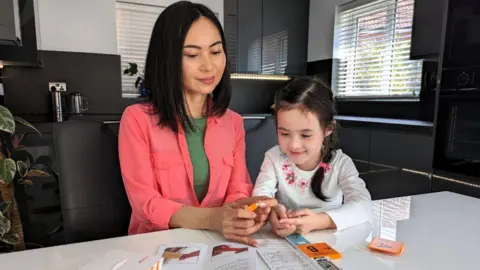Study probes home type 1 diabetes test for children
 Digostics
DigosticsA home test to diagnose type 1 diabetes in children is being investigated in a UK study for the first time.
Researchers at the National Institute for Health and Care Research (NIHR) Oxford Biomedical Research Centre said the study will invite 90 children and young people across two groups to assess the GTT@home test.
The programme would determine whether the kit could be used routinely across the NHS.
Study lead Rabbi Swaby, clinical research fellow in the Nuffield Department of Medicine, said the method "could be a major breakthrough for reducing the burden of testing."
GTT@home is an oral glucose tolerance test (OGTT) that uses finger-prick blood samples to measure how well the body processes glucose.
The kit contains the test device, a finger prick, a preformulated glucose drink and detailed instructions.
The glucose drink is consumed after the initial finger-prick blood sample, with a second blood sample taken two hours later.
The test has been developed by British digital clinical diagnostics and diabetes home testing provider, Digostics.
The researchers said that with standard hospital-based OGTTs, children have to fast overnight, travel to a clinic early in the morning and undergo two blood draws.
But the home device "immediately analyses both blood samples and shares accurate and timely results directly with the study teams."
The team said it had been shown to be "as accurate as hospital-based OGTTs when used with adults."
The test has already been successfully implemented at NHS trusts in Southeast England for the screening of gestational diabetes in pregnancy, with more than 2,500 women screened since its launch in February 2024.
Type 1 diabetes is the most common childhood autoimmune disease, affecting around one in 350 children.
Researchers said that in around 40% of children diagnosis was not made until the child was in diabetic ketoacidosis (DKA), a life-threatening complication.
Dr Swaby said that even though early diagnosis of type 1 diabetes relies on OGTTs, "we know these tests are not well tolerated, especially by very young children.
"At-home testing could be a major breakthrough for reducing the burden of testing."
You can follow BBC Oxfordshire on Facebook, X (Twitter), or Instagram.
